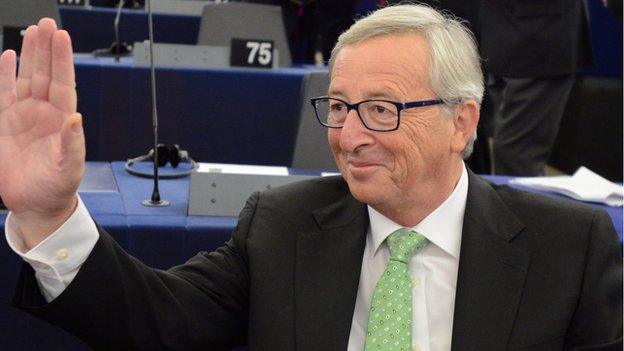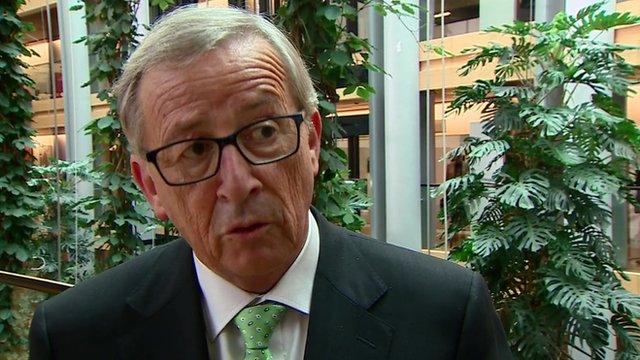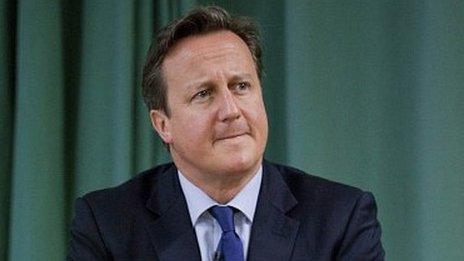EU freedom of movement rules cannot be changed - Juncker
- Published
Jean-Claude Juncker believes that flexibility is needed on all sides to deal with the problems the EU faces
Jean-Claude Juncker, the incoming president of the European Commission, has insisted that rules on freedom of movement in Europe cannot be changed.
David Cameron has suggested the right of EU nationals to live and work in other member states could be qualified.
But Mr Juncker told the BBC if "we change rules on freedom of movement today, tomorrow others will try to change freedom of movement of capital".
He also called for "more flexibility" from the UK on key European issues.
A Downing Street source said: "We will bring forward proposals before Christmas and we are sure they deserve and will get a fair hearing."
The Conservatives are reported to be examining a number of options to limit EU migration amid concerns about the scale of immigration into the UK.
But Mr Juncker, who takes up his post on 1 November, said freedom of movement of people had been a "basic principle of European co-operation" since the Treaty of Rome in 1957, which founded the European Economic Community - the forerunner of the European Union.
He said national governments could take action to address abuses of the existing rules but only if they complied with treaty commitments.
Calls for more far-reaching changes, he added, would have to be discussed in a "friendly way" by all 28 member states and the European Commission, the EU's executive arm.
Open-minded
"We have to approach this problem in an open-minded way but we cannot change the rules," he told the BBC's Europe editor Gavin Hewitt.
"These rules will not be changed but what can be changed are national rules against abuses. There are abuses as far as freedom of movement is concerned but we cannot change European rules."
Mr Juncker questioned the Conservatives' strategy in Europe after the European Conservatives and Reformists Group, the Brussels political grouping that the Conservatives belong to, declined to endorse the new Commission in a vote on Wednesday.
MEPs voted by a large majority overall to support Mr Juncker's new team but nine Conservative MEPs abstained, while three voted against and six in favour.
"I do want flexibility from Britain and then flexibility can be the answer from the European Union not only as far as this problem is concerned but all the problems," Mr Juncker added.
"I took Jonathan Hill in my commission but ECR was abstaining. Is this British coherence?"
'Not unreasonable'
Former Conservative cabinet minister Lord Hill was given one of the leading economic portfolios in Mr Juncker's top team despite the UK opposing Mr Juncker's appointment as Commission boss.
Speaking in the UK Parliament on Wednesday, Mr Cameron said: "We need to get a grip on immigration wherever it is coming from."
He said the government had taken "very big steps forward", including putting in place the first "economic cap" on migration from outside the EU and tightened rules on benefit eligibility.
But he added: "We are convinced there is more to do because the British people are not being unreasonable about this."
All UKIP MEPs voted against Mr Juncker's team on Wednesday, with party leader Nigel Farage predicting that the UK will have pulled out of the EU within five years.
- Published22 October 2014

- Published22 October 2014

- Published16 October 2014
